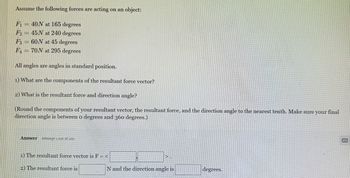
College Physics
11th Edition
ISBN: 9781305952300
Author: Raymond A. Serway, Chris Vuille
Publisher: Cengage Learning
expand_more
expand_more
format_list_bulleted
Question

Transcribed Image Text:Assume the following forces are acting on an object:
F₁ = 40N at 165 degrees
F2 45N at 240 degrees
F360N at 45 degrees
F470N at 295 degrees
All angles are angles in standard position.
1) What are the components of the resultant force vector?
2) What is the resultant force and direction angle?
(Round the components of your resultant vector, the resultant force, and the direction angle to the nearest tenth. Make sure your final
direction angle is between o degrees and 360 degrees.)
Answer Attempt 1 out of 100
1) The resultant force vector is F = <
2) The resultant force is
N and the direction angle is
degrees.
Expert Solution
This question has been solved!
Explore an expertly crafted, step-by-step solution for a thorough understanding of key concepts.
Step by stepSolved in 4 steps with 9 images

Knowledge Booster
Learn more about
Need a deep-dive on the concept behind this application? Look no further. Learn more about this topic, physics and related others by exploring similar questions and additional content below.Similar questions
- Determine the magnitude and the direction cosines of a force which as x , y, and z component of −3 NN, −1 N, and 6 N respectively.Magnitude = in N cosα= cosβ= cosγ=arrow_forwardA force F1 of magnitude of 5 N is directed in 25 degrees East of South, and a force F2 of magnitude of 2 N is directed in 30 degrees North of West. 1. Draw each vector force and give the magnitude and the direction. 3. Component Method of Adding Vectors a. Find the x and y components of each vector. b. Determine the x and the y component of the resultant vector F3 = F1 + F2 . c. Calculate the magnitude and the direction of the resultant vector F3 .arrow_forwardHelp on part Aarrow_forward
- What is the direction angle of the vector 6i +5j -3k measured with respect to the positive x-, y- and z-axis (i.e., a, B and 0 shown in the figure below)? Y (Not to scale)arrow_forwardAt what angle ở must the 400-lb force be applied in order that the resultant R of the two forces have a magnitude of 1000 lb? For this condition what will be the angle ß between R and the horizontal? 400 lb 700 lbarrow_forwardVector Magnitude [Units] Direction 0 Calculated Calculated X-component y-component a 8.1 119.7 -4.01 7.04 b 8.5 69.4 2.99 7.96 8.5 -45 6.01 -6.01 19. Label the resultant sum S. 20. Use your data from the table you just created to calculate the x-component and y-component of S. Show your work: Sx = Sy = 21. Calculate the magnitude of S, show your calculation: |S| = 22. Calculate the direction of S. Show your calculation: Θςarrow_forward
- A force F, of magnitude 5.70 units acts at the origin in a direction 40.0° above the positive x axis. A second force F, of magnitude 5.00 units acts at the origin in the direction of the positive y axis. Find graphically the magnitude and direction of the resultant force F, + F magnitude units direction counterclockwise from the +x axis Need Help? Readarrow_forwardAnd part b.) Determine the direction of vector V measured counterclockwise from the positive x-axis.arrow_forwardThe direction of force P is given by an in-plane and out-of-plane angle. The direction of force Q is given using a similar triangle that is in the yz plane.a) Find the vector forms of P and Q.b) Find the resultant force and its direction cosine angles.arrow_forward
- Don't use chat gptarrow_forwardDetermine the resultant force magnitude, direction, and its angle from the x-axis for force components F1 & F2, components F2 & F3, and components F3 & F4. NOTE: must be solved using the parallelogram method, not the rectangulararrow_forwardF1 F2 Given that F1 825 N, F2 = 630 N, and a = 32° , determine the magnitude of the resultant force and its direction measured counterclockwise from the positive x axis. . The magnitude of the resultant force in N is (round to two decimal places) : N The direction of the resultant force in degrees is (round to two decimal places) : degreesarrow_forward
arrow_back_ios
SEE MORE QUESTIONS
arrow_forward_ios
Recommended textbooks for you
 College PhysicsPhysicsISBN:9781305952300Author:Raymond A. Serway, Chris VuillePublisher:Cengage Learning
College PhysicsPhysicsISBN:9781305952300Author:Raymond A. Serway, Chris VuillePublisher:Cengage Learning University Physics (14th Edition)PhysicsISBN:9780133969290Author:Hugh D. Young, Roger A. FreedmanPublisher:PEARSON
University Physics (14th Edition)PhysicsISBN:9780133969290Author:Hugh D. Young, Roger A. FreedmanPublisher:PEARSON Introduction To Quantum MechanicsPhysicsISBN:9781107189638Author:Griffiths, David J., Schroeter, Darrell F.Publisher:Cambridge University Press
Introduction To Quantum MechanicsPhysicsISBN:9781107189638Author:Griffiths, David J., Schroeter, Darrell F.Publisher:Cambridge University Press Physics for Scientists and EngineersPhysicsISBN:9781337553278Author:Raymond A. Serway, John W. JewettPublisher:Cengage Learning
Physics for Scientists and EngineersPhysicsISBN:9781337553278Author:Raymond A. Serway, John W. JewettPublisher:Cengage Learning Lecture- Tutorials for Introductory AstronomyPhysicsISBN:9780321820464Author:Edward E. Prather, Tim P. Slater, Jeff P. Adams, Gina BrissendenPublisher:Addison-Wesley
Lecture- Tutorials for Introductory AstronomyPhysicsISBN:9780321820464Author:Edward E. Prather, Tim P. Slater, Jeff P. Adams, Gina BrissendenPublisher:Addison-Wesley College Physics: A Strategic Approach (4th Editio...PhysicsISBN:9780134609034Author:Randall D. Knight (Professor Emeritus), Brian Jones, Stuart FieldPublisher:PEARSON
College Physics: A Strategic Approach (4th Editio...PhysicsISBN:9780134609034Author:Randall D. Knight (Professor Emeritus), Brian Jones, Stuart FieldPublisher:PEARSON

College Physics
Physics
ISBN:9781305952300
Author:Raymond A. Serway, Chris Vuille
Publisher:Cengage Learning

University Physics (14th Edition)
Physics
ISBN:9780133969290
Author:Hugh D. Young, Roger A. Freedman
Publisher:PEARSON

Introduction To Quantum Mechanics
Physics
ISBN:9781107189638
Author:Griffiths, David J., Schroeter, Darrell F.
Publisher:Cambridge University Press

Physics for Scientists and Engineers
Physics
ISBN:9781337553278
Author:Raymond A. Serway, John W. Jewett
Publisher:Cengage Learning

Lecture- Tutorials for Introductory Astronomy
Physics
ISBN:9780321820464
Author:Edward E. Prather, Tim P. Slater, Jeff P. Adams, Gina Brissenden
Publisher:Addison-Wesley

College Physics: A Strategic Approach (4th Editio...
Physics
ISBN:9780134609034
Author:Randall D. Knight (Professor Emeritus), Brian Jones, Stuart Field
Publisher:PEARSON